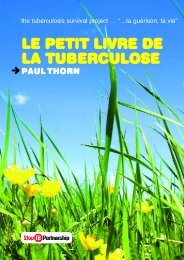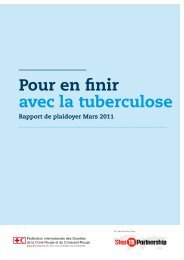Thailand - Stop TB Partnership
Thailand - Stop TB Partnership
Thailand - Stop TB Partnership
You also want an ePaper? Increase the reach of your titles
YUMPU automatically turns print PDFs into web optimized ePapers that Google loves.
lence among <strong>TB</strong> patients in Nigeria increased more than four-fold over the period between<br />
1991 and 2001. 7 In <strong>Thailand</strong>, the resurgence of <strong>TB</strong> and the number of patients coinfected<br />
with <strong>TB</strong>/HIV has been similarly dramatic, yet the integration of the <strong>TB</strong> control program<br />
into the more powerful and better funded National AIDS Control Programme—intended to<br />
promote collaborative <strong>TB</strong> and HIV policies and services—has instead dissipated the authority<br />
and resources of the <strong>TB</strong> program.<br />
International donors cover a large share of <strong>TB</strong> control budgets in Bangladesh,<br />
Nigeria, and Tanzania. For instance, the Tanzanian government in 2003 contributed 10<br />
percent of the National <strong>TB</strong> and Leprosy Programme’s total annual budget. 8 As one Nigerian<br />
health care provider noted, “remove the donor, and everything would crash.” 9 Public Health<br />
Watch researchers unanimously recommend that donors should take greater care to ensure<br />
that assistance programs strengthen long-term capacity to conduct <strong>TB</strong> control activities without<br />
external support. “Most international cooperation is project-based,” researcher Akramul<br />
Islam of Bangladesh said. “But we’re trying to do long-term thinking. Many international<br />
organizations think they will come here and transfer knowledge—but how can you just<br />
transfer knowledge and then wash your hands?” 10<br />
Even in countries such as Brazil and <strong>Thailand</strong>, where domestic spending accounts<br />
for the greater part of the health budget, donor resources are playing an increasingly significant<br />
role in <strong>TB</strong> control. In 2005, 45 percent of the Thai National <strong>TB</strong> Programme budget came<br />
from the Global Fund to Fight AIDS, Tuberculosis and Malaria. In recent years, bilateral<br />
agencies such as the US Agency for International Development (USAID) and other external<br />
public and private funding sources have provided most of the investment in clinical and<br />
operational research in Brazil. Access to global funding streams is making a clear contribution<br />
to national <strong>TB</strong> control efforts in all five countries. Yet Public Health Watch researchers<br />
all expressed concern about the potential for displacement of government responsibility and<br />
the impact on the capacity of governments to sustain <strong>TB</strong> control efforts in the long term.<br />
There has been minimal public mobilization around the need to hold governments<br />
accountable for their commitments to reach Amsterdam Declaration targets. Without<br />
effective pressure from domestic constituencies, governments have had little incentive to<br />
improve their performance on <strong>TB</strong> control. Researcher Ezio T. Santos Filho believes that the<br />
position of a middle-income country such as Brazil on the list of <strong>TB</strong> high-burden countries<br />
can only be explained by the absence of mechanisms to ensure that critical scrutiny<br />
of government <strong>TB</strong> control efforts includes the participation of people from communities<br />
most directly affected by <strong>TB</strong>. And Bangladeshi researcher Afsan Chowdhury insists that<br />
the involvement of dedicated National <strong>TB</strong> Programme officials is not enough; other sectors<br />
must lend their support as well. “We need a broad cross-section of actors involved to have<br />
an effective <strong>TB</strong> control policy,” Chowdhury said. “We need advocates around the minister of<br />
health—we need to make <strong>TB</strong> activists out of politicians. And <strong>TB</strong> needs to be pushed onto<br />
PUBLIC HEALTH WATCH MONITORING REPORTS 15



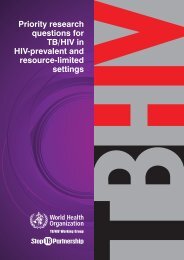
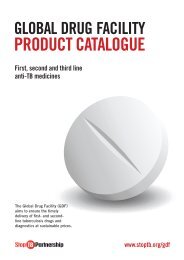
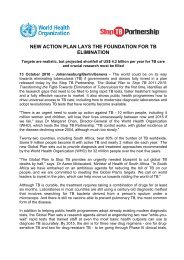
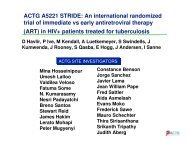
![Global Drug Facility Annual Report 2011 [.pdf] - Stop TB Partnership](https://img.yumpu.com/26788745/1/184x260/global-drug-facility-annual-report-2011-pdf-stop-tb-partnership.jpg?quality=85)

![Concept note on national stop TB partnership [.pdf]](https://img.yumpu.com/26788741/1/184x260/concept-note-on-national-stop-tb-partnership-pdf.jpg?quality=85)

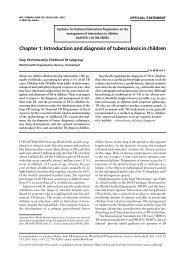
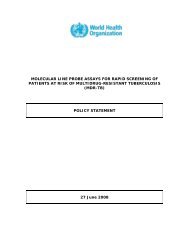
![2005 and Challenges for 2006 - 2015 [.pdf] - Stop TB Partnership](https://img.yumpu.com/26788674/1/190x245/2005-and-challenges-for-2006-2015-pdf-stop-tb-partnership.jpg?quality=85)
![Brochure (French) [.pdf] - Stop TB Partnership](https://img.yumpu.com/17234792/1/190x91/brochure-french-pdf-stop-tb-partnership.jpg?quality=85)
